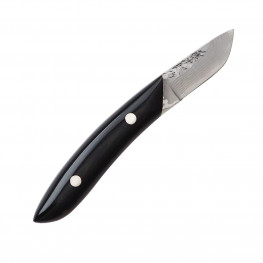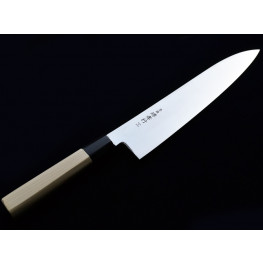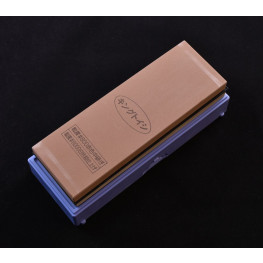Product detail
We buy Japanese knives mainly because of their uncompromising sharpness. However, it should be noted that because of using each knife slowly dulls. It is a natural feature. However, it is up to us to restore it to its most important feature - sharpness. It should be noted that Japanese knives generally have harder blades and finer cutting edges than their European competitors, which is why their sharpening requires a specific approach. Japanese knives are sharpened mainly on whetstones. They are often also called Japanese stones or water stones. In various offers, we encounter diametric differences in the prices of whetstones, which can of course lead to confusion. So let's talk about it.
Whetstones are primarily divided into natural and synthetic. Natural stones were mined in quarries, the most desired from around Kyoto. Today, with few exceptions, they are all closed. However, traders have limited stocks of the basic material from which they make the whetstones. The stones have the mark of quarry, mountain range, type and finally the degree of hardness. The price of natural stones is significantly higher than synthetic ones. Well, as we know, price is a reflection of the ratio of supply and demand. With closed quarries, therefore, the excess demand is understandable. This means that natural stone does not always have to be of better quality than synthetic stone.
Artificial or synthetic stones are like an effort to replace and improve natural stones. Abrasive elements of specific shapes, materials, sizes and quantities are incorporated into the basic material forming the shape of the stone itself (brick). It can be clayey or ceramic. Ceramic is more durable, lasts longer and is designed primarily for sharpening very hard steels. There are several manufacturers in Japan, some of them focus on cheaper stones, others on higher quality and more expensive ones. They use their trademarks and it is difficult for the average user to associate a brand with the manufacturer himself. To make the orientation even more difficult, many manufacturers produce so-called OEM products, i.e. stones for knife manufacturers. These stones have the logos of knife companies and finding their origin is not easy. However, the rule here is that the renowned knife manufacturer offers quality stones that can sharpen hard blades of his knives. In addition, they bear his name and therefore such a purchase is risk-free. In our market we also meet very cheap stones from Chinese manufacturers /e.g. TAIDEA/. However, try sharpening the VG-10 steel blade with them, not to mention aogami.
With synthetic stones, the price says the most about it. It reflects the material of the abrasive elements, their number /grain size/, the quality of the bonding material, the size of the stone and the accessories /pad, toishi/. It is the dimensions of the stone that determine how comfortable and especially how long you will be able to use it.
The stones are lubricated before use. Aggressive stones for grinding garden tools are rubbed with oil, but stones for kitchen knives are lubricated with water. Some require perfect saturation by immersion in water for 10-15 minutes, others just soak briefly and you can start working.
The edge of the Japanese blades is fine and makes an angle of about 15 degrees. The more robust blade has 20 degrees, but beyond this value the limit for Japanese knives ends and starts the domain of European knives. When grinding, it is important to keep the chosen angle, as well as the grinding paste formed on the stone. If your knife has a very neglected blade, or even an indication of chipping, a stone with a coarse grain size of 220 to 400 will help you. You can also use such a stone when formatting a different blade angle. For common basic sharpening, grain sizes of 800 to 1500 are used. If your goal is a "razor blade sharp knife", it is advisable to continue sharpening on higher granulations 2000, 3000, 4000 or 6000. Stones with granulation 8000 and higher are suitable for polishing the edge.
All stones in our shop are original whetstones and come exclusively from Japanese manufacturers. In addition, we also offer additional methods of grinding using sharpening rods or ceramic sharpeners.
However, if you decide to leave the sharpening of your knives to professionals, you can just bring them to our store.
©2010-2018 Copyright Roman Ulík, Nippon Knives, www.japonskenoze.sk,all rights reserved. Photographs and texts are protected by copyright law, and their use without permission of the author is not possible.
About producer

We have been watching the Tojiro brand for several years. We focused our attention not only on the kitchen knives themselves, but also on the history and background of the company, the scope of its assortment and the ability to repeatedly achieve the highest quality standards. Finally, after getting to know each other for a long time, we had the honor of representing the Tojiro brand in Slovakia.
There are several areas in Japan famous for the concentration of exceptional blacksmiths and grinders. Cities like Seki, Sakai, Takefu, Tsubame-Sanjo need no introduction to lovers of noble knives. And it is in the Tsubame-Sanjo area in Niigata Prefecture that Tojiro is based.
Tojiro is known above all for its strict adherence to proven techniques that have been passed down from generation to generation since the Edo period. It was the duty of every wealthy feudal lord to spend a certain amount of time in the capital city of Edo. It was a sign of respect for the ruling shogun. The feudal lords brought the best quality products from their regions to the shogun. Therefore, each of them employed the best craftsmen on their estate. Blacksmiths were of course no exception. Today, the shogun for a Japanese manufacturer is its customer. This explains the enormous care for quality that producers devote to their products.
Since the mere observance of tradition is not enough in today's competitive environment, Tojiro introduces new advanced procedures and technologies into its production. It is enough to mention the DP method, in which the manufacturer can prevent unwanted decarbonization at higher temperatures. The result is very hard and durable blades DP series kitchen knives. It may be safe to say that Tojiro represents a clear symbiosis of tradition and revolutionary techniques.
Nippon Knives has selected for you the most interesting from the Tojiro production program, not only in terms of quality but also in terms of price. The ratio of price to performance is a very strong point of the Tojiro company. See for yourself and enter the catalog of our products.
©2010-2018 Copyright Roman Ulík, Nippon Knives, www.japonskenoze.sk all rights reserved.
Photos and texts are protected by copyright law and their use without the author's consent is not possible.


 Sign in
Sign in Registration
Registration




































